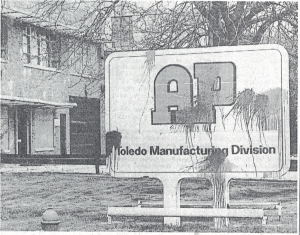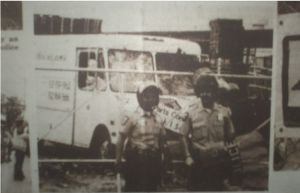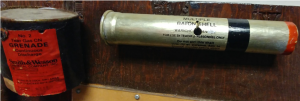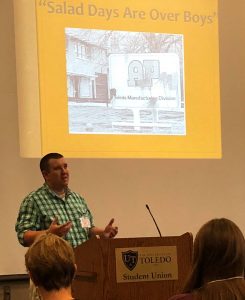Tags

Over the course of the last semesters I have worked on the strike of the AP Parts workers in Toledo, 1984. I found that it provides a fascinating perspective on labor relations and city-industry relations at a time of dramatic transformations in the industrial sector.
“Salad days are over” a quote from Paul Putnam the President of AP Parts to his workers published in the Toledo Blade on May 7th, 1984 two days after workers walked out of AP Parts factory on Matizinger road in Toledo, Ohio. AP Parts before the strike demanded cuts in health benefits, $5.84 an hour pay cut, and the end of the 30 and out retirement pension program. The company built larger fences around the property in anticipation for the strike and began to hire temporary workers. Joseph Tomasi Director of UAW Region 2B wrote a letter on February 27th, 1984 to Paul Putnam where he stated, “You are preparing for war, not running a business.” Workers unable to accept the terms of the contract walked out on May 5th, 1984 after being harassed by management and hired security from Nuckols Security of Cincinnati, Ohio.
May 21st, 1984 a riot broke out in front of the plant as a massive rally for the strikers broke down into a riot as thousands of union workers from Local 12 of Jeep, Local 14, and community members flooded Matzinger road in support of AP strikers. Police and security tried to control the crowd, but communication broke down leading to violence as rocks where thrown, cars smashed, smoke grenades and rubber bullets fired into the crowd.

 Police control tactics failed as the fighting continued till the crowd lost the energy to go on. The strike would last 9 months with continued failed negotiations due to court cases against the picket lines, assaulting of scab workers, destruction of police, AP Parts, and Local 14 property, and constant harassment by police and Nuckols Security. AP Parts and Local 14 maintained a hostile environment for months. It took wide community support, economic pressure of boycotts, reduced production, and the city government to step in to end the strike on behalf of the workers. In the end the workers preserved the 30 and out program and reduced the wage cut but where forced into a two-tier wage system that forced new workers to make less than their coworkers for a period of time. The strike was unique opportunity where Toledo’s strong union support and history of revolting companies helped them win the strike during a time of the American Labor movements major retreat.
Police control tactics failed as the fighting continued till the crowd lost the energy to go on. The strike would last 9 months with continued failed negotiations due to court cases against the picket lines, assaulting of scab workers, destruction of police, AP Parts, and Local 14 property, and constant harassment by police and Nuckols Security. AP Parts and Local 14 maintained a hostile environment for months. It took wide community support, economic pressure of boycotts, reduced production, and the city government to step in to end the strike on behalf of the workers. In the end the workers preserved the 30 and out program and reduced the wage cut but where forced into a two-tier wage system that forced new workers to make less than their coworkers for a period of time. The strike was unique opportunity where Toledo’s strong union support and history of revolting companies helped them win the strike during a time of the American Labor movements major retreat.

The goal of the project was to find an untold story of Toledo history and bring new light to the story. In the case of the AP Parts strike it was to find out why such a large riot in Toledo’s history was covered up. During the research I discovered the city of Toledo was interested in maintaining their image as a business-friendly city combined with the UAW trying to maintain a professional image led to the strike not being talked much outside of a few labor historians, journalist, and professors. The UAW and Toledo wanted to move on and unintentionally buried a major victory for the Toledo Labor Movement during a period of major retreat. Working on this project allowed me to speak with the workers and use there oral histories combined with empirical research to bring to light this forgotten piece of Toledo history.
*Note on images first photo published in Toledo Blade May 3, 1985, second photo Theory and Practice Newsletter June 1984, third photo Toledo Union Journal May 25, 1984 Toledo-Lucas County Public Library Rogowki-Kaptur Labor History Room, and fourth photo AP Parts Strike Placard Toledo-Lucas County Public Library.
